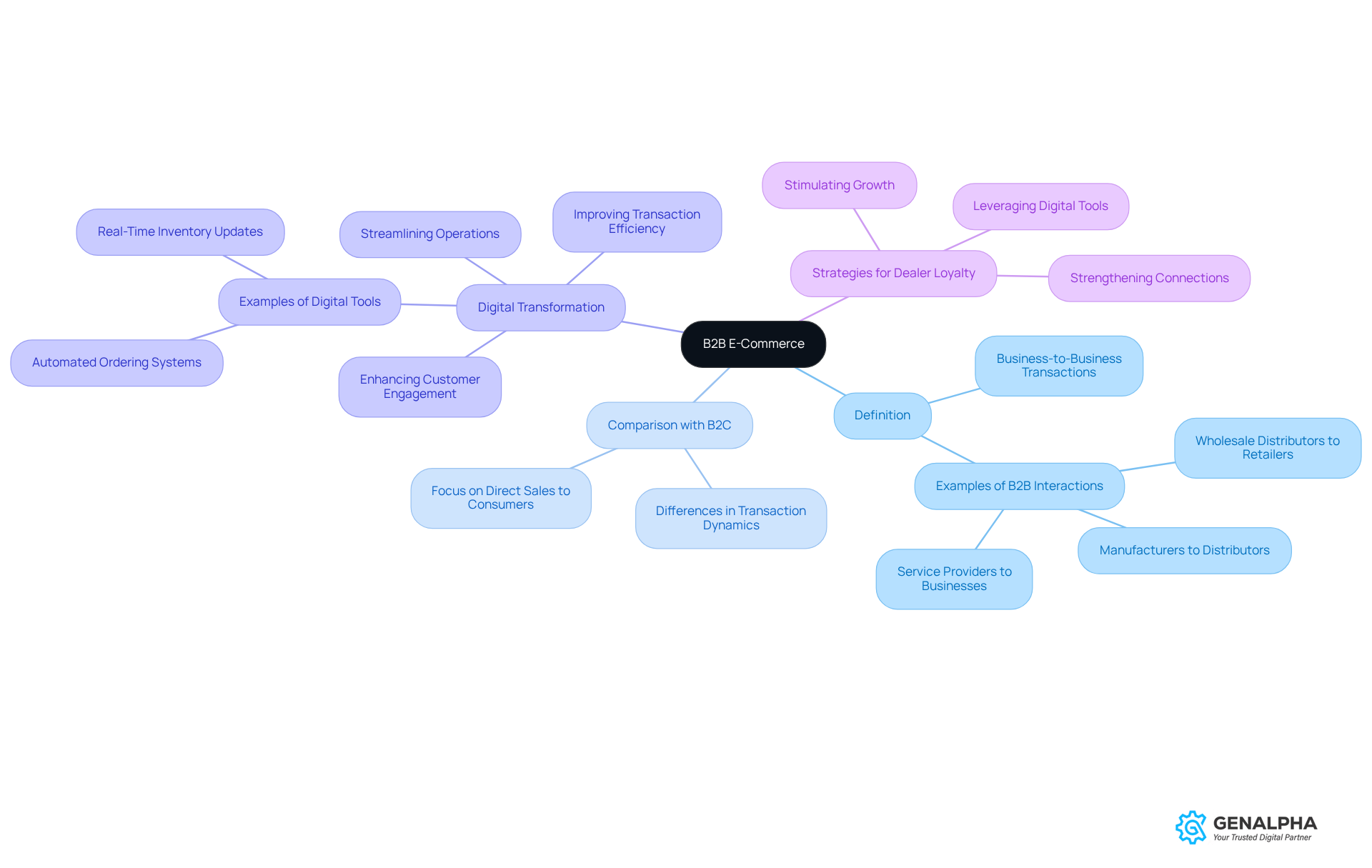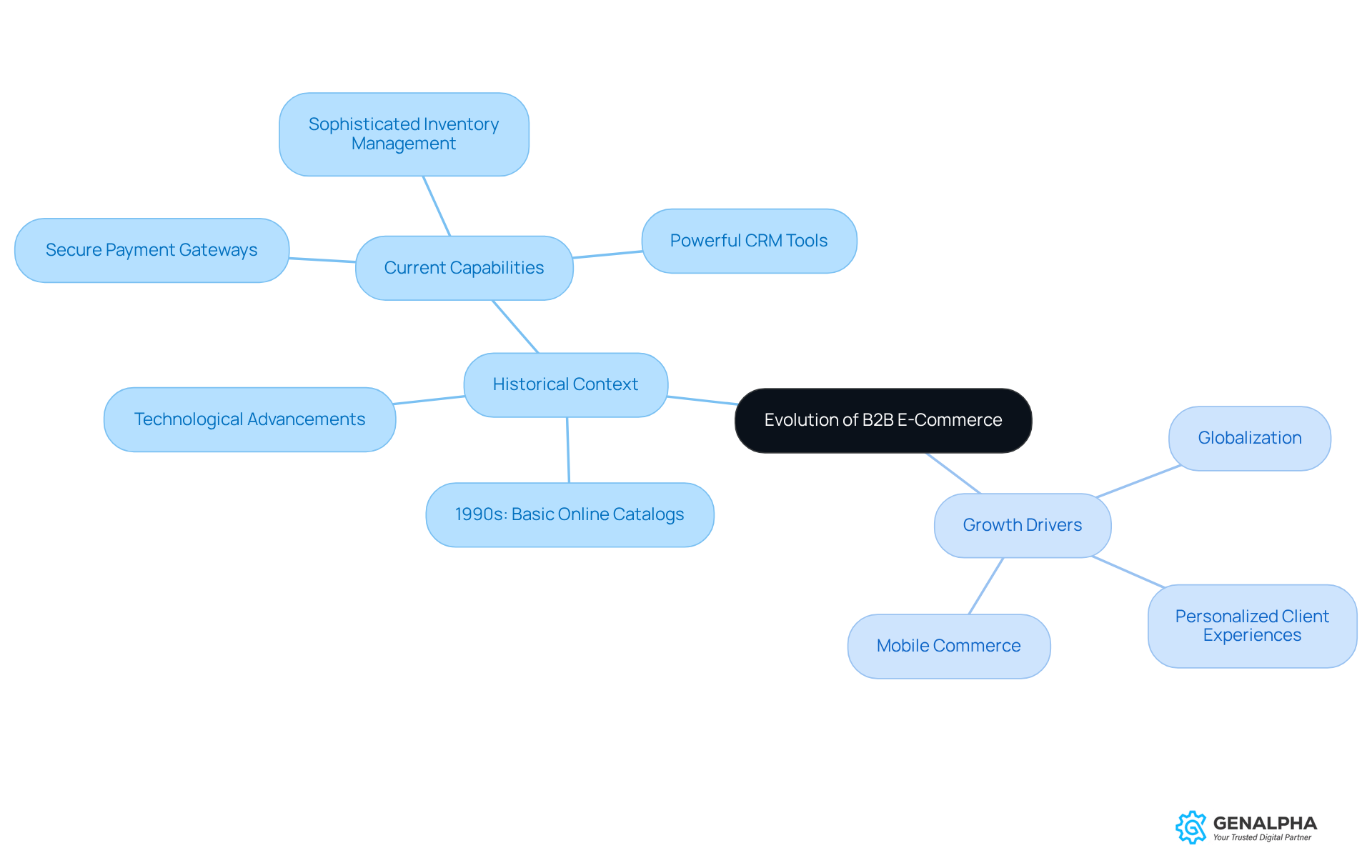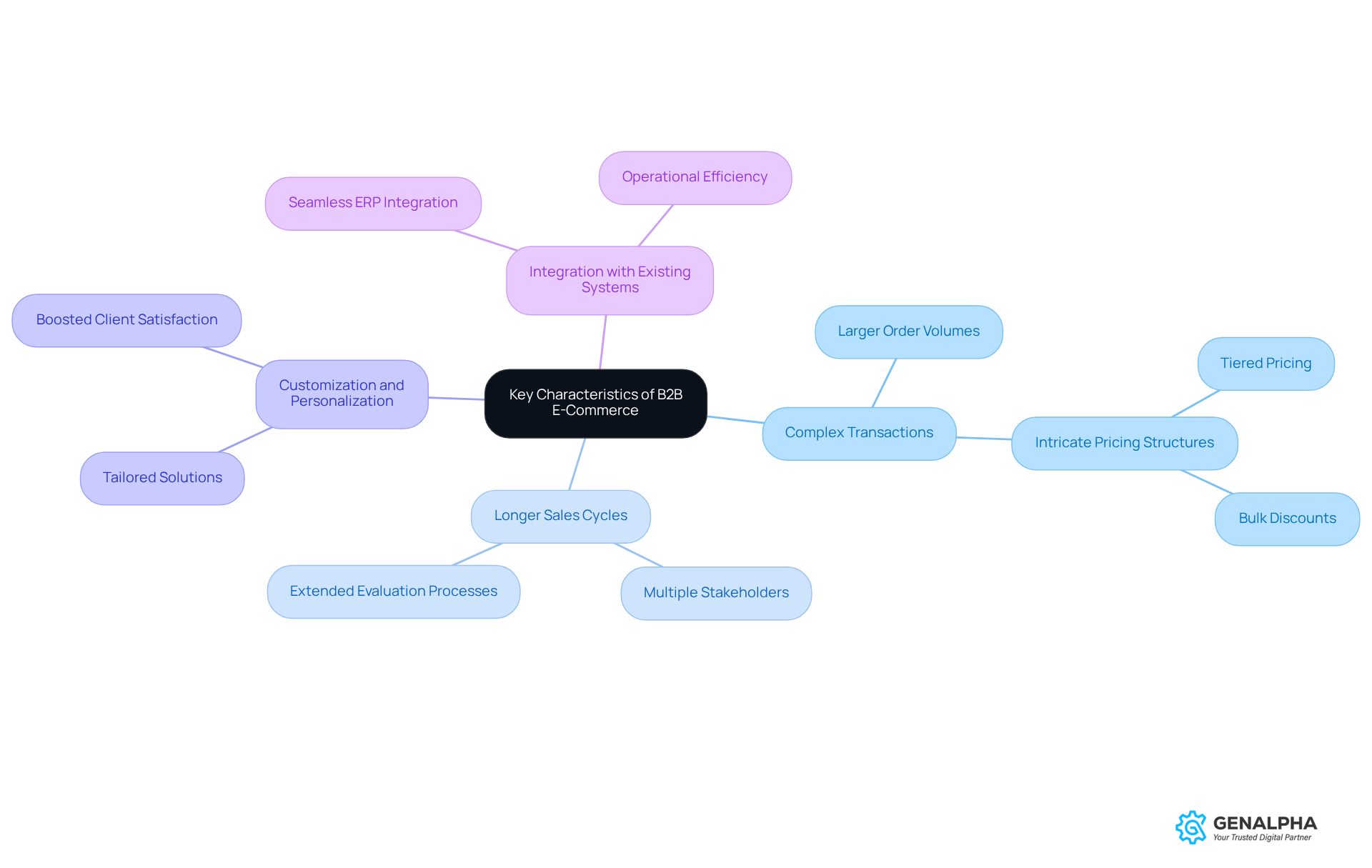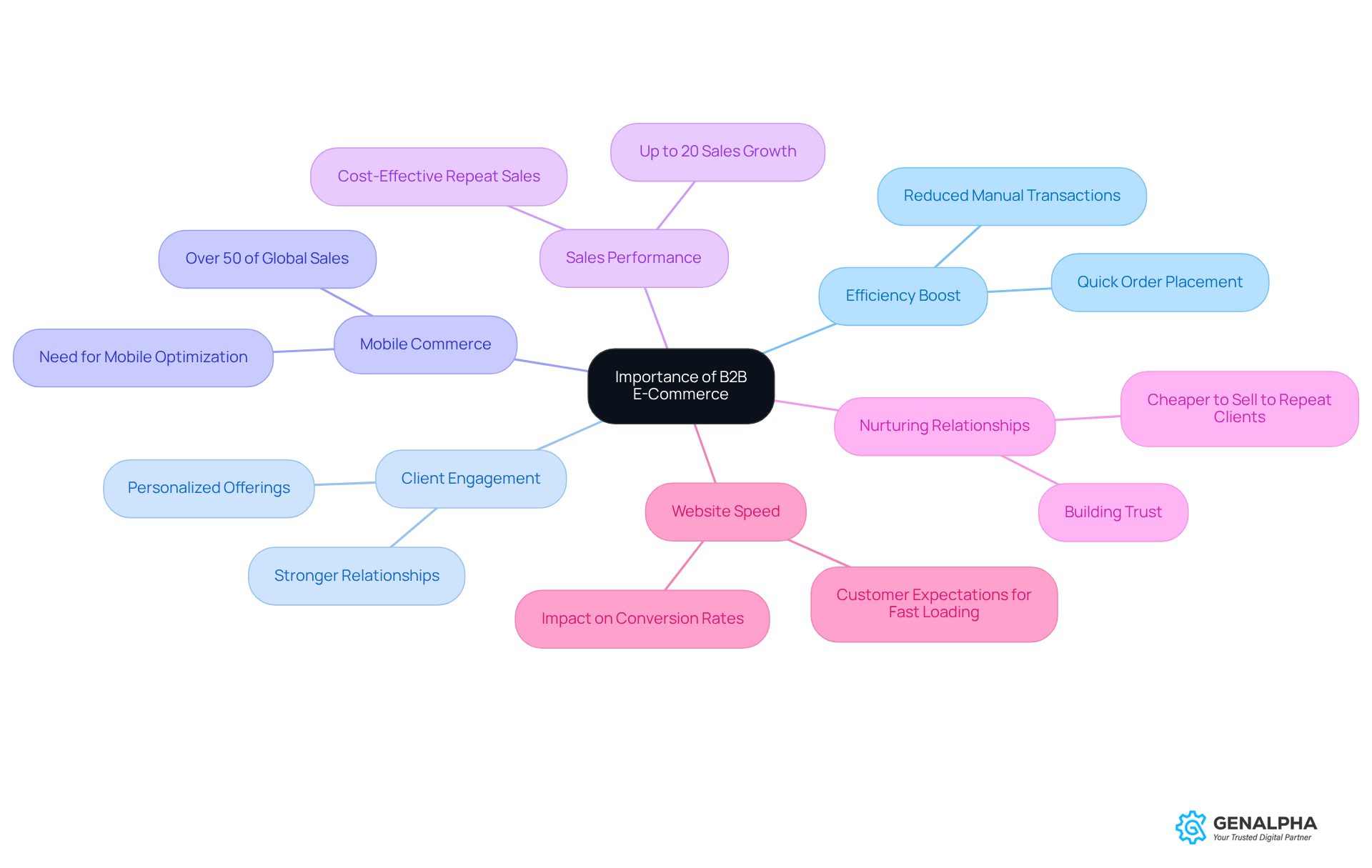Overview
B2B e-commerce is a game changer for equipment manufacturers. It not only streamlines operations but also boosts customer engagement and efficiency through digital platforms. Have you ever thought about how embracing technologies like automated ordering systems and data analytics can really strengthen dealer relationships? It’s pretty fascinating!
By leveraging these tools, manufacturers can drive growth in a competitive market. Imagine being able to connect with your dealers more effectively and making their lives easier. That’s the kind of relationship that can lead to success!
So, why not take the plunge? Embrace these technologies and watch your business thrive. After all, in today’s fast-paced world, staying ahead means adapting to the latest trends. Let’s get started!
Introduction
B2B e-commerce is shaking things up for equipment manufacturers, moving away from the old-school sales methods to lively online transactions. This shift not only makes operations smoother but also boosts customer engagement. It’s a fantastic chance for manufacturers to forge stronger bonds with their dealers. But as the digital world keeps changing, you might wonder: how can businesses tap into these shifts to stay ahead and secure long-term growth?
Think about it: when was the last time you made a purchase online? The convenience and speed are hard to beat! Now, imagine how that same ease can transform the way manufacturers connect with their customers. By embracing e-commerce, they can not only streamline their processes but also create a more engaging experience for everyone involved.
So, what’s the next step? It’s all about adapting to this new landscape. Manufacturers need to explore how they can leverage these digital tools to enhance their relationships and stay competitive. Let’s dive into how this transformation can lead to lasting success!
Defining B2B E-Commerce: A Comprehensive Overview
B2B-e-commerce, or business-to-business online trade, involves all the online transactions and interactions that occur between companies. Think about it: while B2C (business-to-consumer) e-commerce focuses on selling products directly to consumers, B2B-e-commerce is where one company sells goods and services to another. This could mean wholesale distributors supplying retailers, manufacturers providing to distributors, or service providers delivering solutions to other businesses.
With the rise of digital platforms, traditional sales processes have been transformed. Companies can now streamline operations, enhance customer engagement, and improve overall efficiency in their transactions. For example, smart manufacturers are tapping into these digital advancements to boost dealer loyalty. They’re simplifying parts processes by implementing automated ordering systems and providing real-time inventory updates.
These strategies not only strengthen connections with dealers but also stimulate growth. In today’s competitive B2B-e-commerce environment, focusing on improving dealer loyalty is becoming increasingly essential. So, how are you leveraging digital tools to enhance your business relationships? Let's explore the possibilities together!

The Evolution of B2B E-Commerce: Historical Context and Growth Drivers
Let’s take a trip back to the 1990s, when the internet was just starting to make waves. Businesses were beginning to see the potential of online transactions, and that’s when b2b-e-commerce started to take shape. At first, it was pretty basic—think online catalogs and simple order forms. But as technology advanced, so did the capabilities of these online platforms.
Fast forward to today, and we’ve got secure payment gateways, sophisticated inventory management systems, and powerful client relationship management (CRM) tools. These innovations have really transformed the b2b-e-commerce landscape. Now, we’re seeing trends like:
- Globalization
- The boom of mobile commerce
- A growing demand for personalized client experiences
These trends are driving the expansion of b2b-e-commerce. It’s become a vital part of modern business strategies.
So, how can your business tap into this thriving market? It’s all about embracing these changes and adapting to the new landscape. What steps can you take today to ensure you’re not left behind in this digital age?

Key Characteristics of B2B E-Commerce: Understanding Its Unique Components
When we think about B2B e-commerce, it’s clear that it has some unique features that set it apart from B2C transactions. Let’s break it down:
-
Complex Transactions: Ever noticed how B2B deals often involve larger order volumes? They come with intricate pricing structures too, like tiered pricing and bulk discounts. It’s a whole different ball game!
-
Longer Sales Cycles: Have you ever been part of a decision-making process that felt like it took forever? In B2B, that’s pretty common. With multiple stakeholders involved, the evaluations can take quite a bit of time.
-
Customization and Personalization: One of the cool things about B2B platforms is how they often offer tailored solutions. These are designed to meet the specific needs of businesses, which really boosts client satisfaction.
-
Integration with Existing Systems: And let’s not forget about the tech side! For B2B e-commerce to work smoothly, it needs to integrate seamlessly with existing enterprise resource planning (ERP) systems. This ensures everything runs like a well-oiled machine.
So, what do you think? Understanding these components can really help us navigate the B2B landscape more effectively. If you’re involved in this space, consider how these factors play into your strategy!

The Importance of B2B E-Commerce for Modern Businesses: Enhancing Efficiency and Engagement
B2B online trading is a game changer for modern businesses, isn’t it? It really boosts efficiency and makes client interactions a breeze. Think about it: with just a few clicks, companies can place orders quickly and easily, cutting down on all that time spent on manual transactions.
Plus, these B2B online commerce platforms come packed with powerful data analytics. They give insights into customer behavior and preferences, which means businesses can tailor their offerings just right. And let’s not forget how this tech improves communication and collaboration between suppliers and buyers, helping to build stronger business relationships.
Did you know that mobile commerce makes up over 50% of global eCommerce sales? That’s a huge reason why mobile optimization is a must for B2B online retail. Companies that embrace b2b-e-commerce often see better sales performance, happier clients, and a solid edge over competitors. In fact, businesses that focus on client engagement through these platforms can see sales rise by up to 20%! That really shows how important a customized strategy is in the B2B space.
And here’s something to think about: selling to repeat clients is not only cheaper but also easier than chasing new ones. This really underscores the need to nurture those strong relationships. Lastly, let’s talk about website speed. Slow-loading sites can really hurt conversion rates, so it’s crucial for businesses to optimize their online presence.
So, what’s your take on enhancing your B2B online trading strategy?

Conclusion
B2B e-commerce is really shaking things up in the business world, making it easier for companies to connect and transact in ways we never thought possible. As businesses embrace this digital shift, getting a handle on the ins and outs of B2B e-commerce is crucial for success. It’s not just a passing trend; focusing on dealer loyalty and using digital tools can truly transform business relationships and boost operational efficiency.
As we dive into B2B e-commerce, some key insights pop up. Think about the unique traits like complex transactions, longer sales cycles, and the need for smooth integration with existing systems. The journey of B2B e-commerce has been driven by factors like globalization and mobile commerce, which are changing how businesses operate. Plus, emphasizing client engagement and the power of data analytics shows that a solid B2B strategy can really ramp up sales performance and strengthen business ties.
But these insights go beyond just transactions; they push us to rethink how we engage with partners and clients. In the ever-evolving equipment manufacturing sector, tapping into the benefits of B2B e-commerce is essential for staying ahead of the competition. Companies need to not only adapt to these changes but also actively invest in boosting their digital capabilities. This way, they can build lasting relationships and drive growth in this fast-paced environment.
So, what’s the takeaway?
- Embrace the digital shift
- Invest in your capabilities
- Watch your business relationships flourish
Are you ready to take the leap into the future of B2B e-commerce?
Frequently Asked Questions
What is B2B e-commerce?
B2B e-commerce, or business-to-business online trade, involves all online transactions and interactions that occur between companies, where one company sells goods and services to another.
How does B2B e-commerce differ from B2C e-commerce?
B2C e-commerce focuses on selling products directly to consumers, while B2B e-commerce involves transactions between businesses, such as wholesale distributors supplying retailers or manufacturers providing to distributors.
What are some benefits of B2B e-commerce for companies?
B2B e-commerce allows companies to streamline operations, enhance customer engagement, and improve overall efficiency in their transactions.
How are companies using digital platforms in B2B e-commerce?
Companies are leveraging digital platforms to boost dealer loyalty, simplify parts processes through automated ordering systems, and provide real-time inventory updates.
Why is improving dealer loyalty important in B2B e-commerce?
In today's competitive B2B e-commerce environment, focusing on improving dealer loyalty is essential for stimulating growth and strengthening connections with dealers.




